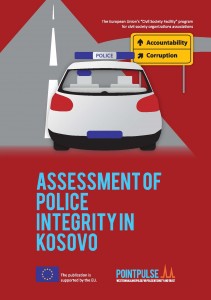2015 ASSESSMENT OF POLICE INTEGRITY IN KOSOVO
2015 ASSESSMENT OF POLICE INTEGRITY IN KOSOVO
Author(s): Plator Avdiu, Skender Perteshi
Subject(s): Governance, Security and defense, Corruption - Transparency - Anti-Corruption
Published by: BCBP Beogradski centar za bezbednosnu politiku
Keywords: police integrity; Kosovo; police sector; corruption
Summary/Abstract: The Kosovo Police is ranked by the citizens of Kosovo among the most trusted institutions; however, its independence and integrity require further improvement. There have been several occasions when the Minister of Internal Affairs, albeit indirectly, commented on police operations; this was noticed particularly during the 2015 protests in Kosovo against the Government. This raises the issue of depoliticization of the police force, as well as claims that the latter is influenced by the executive power. As regards other components of integrity, the Kosovo Police still does not possess the ‘integrity plan’ which would guide the most fundamental principles on enhancing accountability, impartiality and honesty. Bearing in mind that members of the police force are among the oldest in the region when it comes to average age, the early retirement of approximately 1,000 police officers and the recruitment of new ones will represent quite a challenge. There is also a need for better cooperation between the Kosovo Police and the State Prosecutor’s Office, the strengthening of professional capacities and human resources of the Police Inspectorate of Kosovo needed for inspecting and investigating the police, and for better supervision of the police activities by external oversight institutions, the Assembly of Kosovo in particular. This report aims to assess the integrity within the Kosovo Police and to address the key problems and challenges. Progress and regress in relation to police integrity is measured through six sections or indicators: the transparency of police work, the influence of political interests on the operational work of the police, human resources management, financial management, internal control and external oversight of police work. Given that this is a comprehensive study, it provides a qualitative analysis of the relevance of integrity principles, with the aim of keeping the Kosovo Police accountable, honest and ethical. The study revealed six major findings. (i) In general, the Kosovo Police is transparent in terms of providing information to the media and the public. The police Information and Public Relations Office is in charge of conducting all the activities related to transparency. However, the police are far from being perfect in this context. There should be far less bureaucracy when it comes to access, statistics, data and detailed information about its work. Therefore, the Kosovo Police should be more proactive to ensure its timely transparency concerning the requests from media, non-governmental organizations and other relevant parties.
Series: BCBP - Assessment of Police Integrity
- Page Count: 26
- Publication Year: 2015
- Language: English
- Content File-PDF

